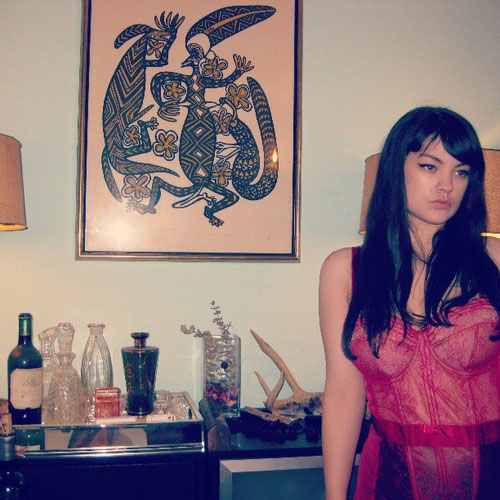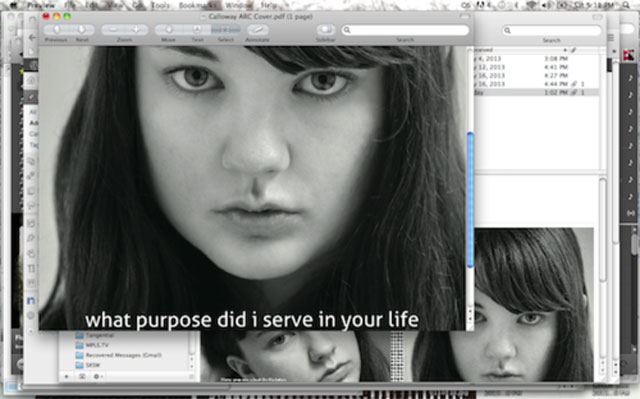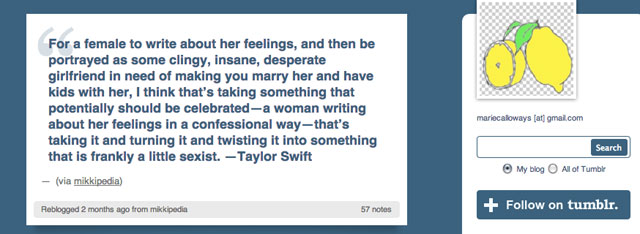 I will admit that when I read Marie Calloway’s short story “Adrien Brody” last year shortly after it blew up, I was instantly blinded by a deep rage, and could not figure out what about that story elicited such a strong reaction from deep inside my soul. There is the fact that Calloway is a very young writer, younger than myself, and when you’re young and somebody does something that you do and gets a lot of attention for it, you’re automatically going to feel murderous. There’s the part where Tao Lin is obsessed with her, but I don’t even like Tao Lin, so it isn’t that, I don’t think — even though he is definitely a “cool guy.” And then, duh, there is the part where she got a book deal before she was finished with college.
I will admit that when I read Marie Calloway’s short story “Adrien Brody” last year shortly after it blew up, I was instantly blinded by a deep rage, and could not figure out what about that story elicited such a strong reaction from deep inside my soul. There is the fact that Calloway is a very young writer, younger than myself, and when you’re young and somebody does something that you do and gets a lot of attention for it, you’re automatically going to feel murderous. There’s the part where Tao Lin is obsessed with her, but I don’t even like Tao Lin, so it isn’t that, I don’t think — even though he is definitely a “cool guy.” And then, duh, there is the part where she got a book deal before she was finished with college.
Or maybe I feel as though I should loathe her based on the sole fact that she is controversial: Dr. Phil himself invited — then uninvited — Calloway to be on his show, after producers decided they did not feel comfortable promoting a book with such explicit content. Three separate printing presses refused to published the sexually explicit photos included in her book, which include photos of the bruised underside of her boob, and the about-to-be-infamous selfie of Calloway with a man’s u-know-what stuff all over her face.
This kind of content has been published plenty of times on the internet, but what purpose did i serve in your life might be a first, as far as material published by a commercial publisher goes. Out in early June from Tyrant Books (and reviewed by Gabino Iglesias here), what purpose did i serve in your life is a collection of short stories strung together to form a loose narrative. The stories read in chronological order: Marie Calloway, the narrator of all of them (and also the author’s pseudonym), is 18 in the first story and 22 in the last. So, you know, young.
In the first story, Calloway’s narrator prostitutes herself for the first time because she wants money “for margaritas” as she travels around Europe; in the final story, she has a threesome with two guys who are friends. In between, she has sex for money a few more times, seduces an author she idolizes (“Adrien Brody,” confirmed by superfans to be author and editor of The New Inquiry Rob Horning), and quotes some of her most hateful critics. There are also many transcriptions of Facebook chat conversations between her and men who want her bod really badly.

You can browse the Marie Calloway tag on Tumblr and look at beautiful photos of Calloway, mostly photos she’s taken of herself, where she looks like a sweetheart mystery babe, with hair that is long, banged, and pin-up-ish — like the cam girl of every dude’s dreams. But Calloway makes it clear she has not always been pretty, and talks almost ad nauseum about being “ugly” and “teased” as a teen.
In the story “Adrien Brody,” which is the story Muumuu House published in early 2012 that got her this book deal and, IMHO, also happens to be the strongest story in this collection, Calloway’s character sleeps with “Adrien Brody” (Rob Horning), and says this to him when they’re hanging out post-banging: “I wonder what would have happened to me if I hadn’t gotten attractive… I can’t get the idea out of my head that I feel safer when I look pretty. [How] I felt the defining theme of my life has always, always been the way I look.”
How true and real and awful that statement is. It is a thought I have had before, and it articulates pretty perfectly what is so complicated about being young and being a girl. I don’t think Calloway would trade her beauty and her youth for anything right now, nor should she want to, but it obviously isn’t something she takes for granted either. Instead, she takes pleasure in it, manipulates it, and takes pleasure in manipulating it. It is interesting to watch.
The part about Calloway’s writing I find most interesting isn’t the prose, which is journalistic at best, but rather the traits of Calloway’s narrator. She is such a weirdo. She is as kawaii as they come, and she is also needy, crippingly anxious, and self-absorbed. She is very “feminine.” Obsessively documenting her often-forced sexual encounters with men (some of whom are nice, some of whom are mean, some of whom are pathetic, some of whom are boring) and allowing herself to be willfully used by them allows her to expose the problems between the sexes. If I am going to be frank or whatever, the problem is how pitiful and dumb and savage dudes can become when it comes to girls and banging them. (I didn’t say do become — I say can become. Relaaaax.)
Related Posts

It has taken me a while to write about Marie Calloway because I don’t think I knew exactly what I wanted to say, and I wasn’t sure how it would come across to other people. But what Marie Calloway is doing shouldn’t be called anti-feminism, because what she’s doing is, very obviously, a positive thing for girls. I also found out that she is a big Taylor Swift fan and reblogged that quote up there on her own Tumblr. And, let’s be real: Calloway and Taytay and Lena Dunham are all fighting the same vague fight, and are getting a lot of hate for it.
Also, so this whole article isn’t just me talking about girls and feminism: to be as young as Calloway is, and to write like your view of the world is as serious and as important as everybody else’s view of the world is — that is a very brave thing. Even if you are an 18-year-old college girl writing a story about how you had sex in London for beer money and enjoyed it. You did it, and it meant something. That is how you get a voice. That is how you get heard.
(PS: This “25 points” article on HTMLGIANT about Marie Calloway’s book should be read, because it’s good.)
—
Christina Drill is a freelance writer who lives in Brooklyn. She gets obsessively preoccupied with people she finds cool and infuriating at the same time so that’s why she wrote this.
Related Posts